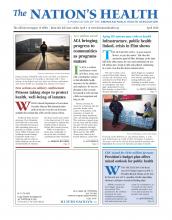Uninsured U.S. kids are least likely to access health care that aligns with patient-centered medical home care, according to a recent study.
The findings were published in the March issue of the Maternal and Child Health Journal.
A patient-centered medical home is a primary care model focused on holistic health through a team of health care professionals that develops a close working relationship with a patient.
“The idea of the study was to provide the first national long-term look at how children’s primary care is evolving,” said lead study author Gregory Stevens, PhD, MHS, an associate professor of family medicine and preventive medicine at the University of Southern California Keck School of Medicine. “This was a chance for us to look at trends over time. I’ve studied primary care for over a decade. It’s an undeniably important thing for kids to have access to.”
The study looked at more than 289,000 children in the National Survey of Children’s Health in 2003, 2007 and 2011-2012. Researchers looked at four features of medical homes: access, comprehensiveness, continuity and family-centered care. The study defined continuity as whether a child had a personal doctor or nurse, access as whether a child had at least one preventive care visit in the past year, comprehensiveness as whether a child got all necessary medical care in the past year and family-centered care as whether a doctor spent enough time with the child.
Researchers also looked at five risk factors for poor health care: race, household language, poverty level, parent education levels and health insurance coverage.
Overall, there were improvements in access and continuity of care for U.S. kids from 2003 to 2012, but declines in comprehensiveness and family-centered care, which were more pronounced for uninsured children.
Between 2003 and 2012, kids with more risk factors, such as being uninsured, had more significant highs and lows in their health care experiences than kids with fewer risk factors. While uninsured children saw an increase in continuity of care, there were declines in access, comprehensiveness and family-centered care.
Stevens said the public health community must advocate for not only better access to primary care but more dedicated resources as the strengths of public health play out in the primary care system. Expanded insurance coverage and access for uninsured children is also essential, such as through federally qualified health centers, which provide care for uninsured and underinsured families, Stevens said.
“There are implications for kids who don’t get good primary care,” Stevens told The Nation’s Health. “If you don’t have access or time to spend with your provider, you’re less likely to get screened for common child health problems, less likely to get advice about smoking, nutrition, all those things that are important to experience in primary care.”
For more information, visit http://link.springer.com/article/10.1007%2Fs10995-015-1902-z.
- Copyright The Nation’s Health, American Public Health Association









